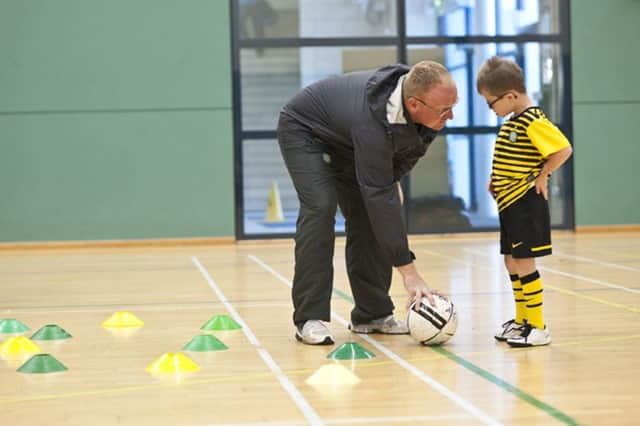Helping children with Down’s syndrome reach potential


Children with Down’s syndrome (DS) often have delayed development in communication, fine and gross motor skills and social and emotional awareness. Many of the challenges and difficulties you may experience with regards to supporting children in your school or nursery will most likely be related to their development delays that can at times manifest in behaviour that challenges.
Children with DS deserve the opportunity to maximise their learning potential and to be positively and successfully included in class. This can be done by increasing awareness of the development of children with DS, providing children with the right level of support and creating an individual education plan that supports their specific learning profile. Successful inclusion is vital so that children with DS become confident and effective contributors.
Advertisement
Hide AdAdvertisement
Hide AdDown’s Syndrome Scotland’s family support service team not only provides information and aid to professionals and carers supporting a child, young person or adult with DS, we can also offer training to support educational establishments from nursery through to further education. Last year, we delivered Education Scotland Continued Professional Development accredited training courses within 19 local authorities across Scotland.
The start of the school year can be stressful for parents, children and teachers. If you’re expecting a child with DS in your classroom and haven’t received bespoke training to support you to meet the child’s needs, then it can be even more stressful for you, the child and parents. By understanding the specific learning profile of a child with DS, you can be better equipped to fully support their education.
Because of poor muscle tone, children with DS have weaker facial muscles that make it difficult for their mouth to form the shapes needed to speak clearly. These difficulties are different for every child. As an education professional, it is important for you to understand these issues along with the oromotor, auditory memory and semantic challenges that children with DS face. Once you understand these difficulties, you can understand where their communication strengths lie and you can introduce strategies to support their short-term memory and language skills.
There is often a misconception that children with DS can be difficult to teach. Often stereotypical comments around behaviour such as “stubborn”, “lazy” and “disruptive” are used. However, we must remember that behaviour is a form of communication. Often children with DS have communication difficulties, so they might be acting out to convey a message. It’s important to examine what causes behaviour and to understand the influence our values have on how we perceive and experience behaviour that challenges.
It’s vital to create functional and positive strategies along with visual supports to enable the child to cope better and thus lessen the challenges. This will result in teachers feeling better equipped to support the child with DS in their class and the child will be happier and a more successful learner overall.
Maggie MacLardie, support for learning leader at St Augustine’s High School, said: “We found Down’s Syndrome Scotland’s family support service input invaluable. They provided training and attendance at young person’s planning meetings during the transition process.
“Before we contacted DS Scotland, our main concerns were providing appropriately adapted materials to our pupil with Down’s syndrome and the pupil’s risk of becoming socially isolated. The family support service put us in touch with two other mainstream schools who had success with this issue.
“The family support service reassured us that, with this case, the parents’ main priority was for their daughter to experience a mainstream secondary school. DS Scotland’s training is useful as it addresses concerns schools have such as how best to support a pupil with Down’s syndrome so that they achieve academically.”
Advertisement
Hide AdAdvertisement
Hide AdLynn Murray is a parent of a child in mainstream secondary education and received support from DS Scotland’s family support service when her child was transitioning to secondary.
“Having DS Scotland’s family support service involved in our transition meant that we had their experiences of working with other children with Down’s syndrome in similar situations,” said Lynn. “This can be a stressful time for everyone – a fear of the unknown. The family support service supported those involved in the education side, along with helping my family navigate through the transition process. They’ve continued to be a great support for us.”
Down’s Syndrome Scotland provides training on Down’s syndrome awareness and inclusion, looking specifically at the learning strengths, positive behaviour management, improving communication skills and teaching reading.
We also offer bespoke training or individual consultation at your nursery or school, and continue to offer ongoing information and support post training.
We also have helpful resources on behaviour, teaching reading and more available through our library, which is free to members.
• Jo Hughes is a family support service officer for the west of Scotland, with Down’s Syndrome Scotland www.dsscotland.org.uk/training
SEE ALSO